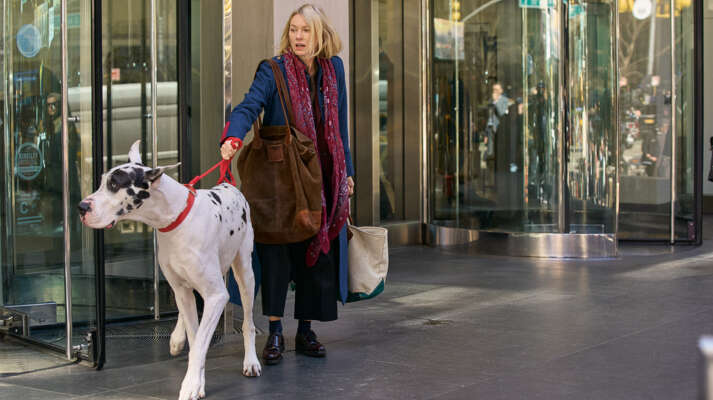Q&A with Esther Yoo
Meet the violinist who brings to life On Chesil Beach's musical spirit
Q&A with Esther Yoo
Written by Peter Bowen
In Dominic Cooke's On Chesil Beach, Saoirse Ronan plays Florence Ponting, a promising young violinist whose dream of a happy future with her new husband Edward Mayhew (Billy Howle) is derailed by the reality of their wedding night. For Ian McEwan, who wrote the original novel and subsequent screenplay, the role of music is essential. "My life is absolutely permeated by music," McEwan told NPR in an interview about the novel. "It is part of my own mental furniture so it often ends up being part of the fate and destiny of my own characters to either be musicians or for music to be something of a key to their characters." To unlock the importance of music for Florence, Cooke reached out to violinist Esther Yoo to play the music we hear when we see Ronan playing. Music has also been essential part of Yoo's life. Having started playing at age four, she performed her first concert at eight. In 2010, at age 16, she gained international attention when she became the youngest prizewinner of the 10th International Sibelius Violin Competition. From 2014 to 2016, she shone as a BBC Radio 3 New Generation Artist and continues to be a bright star in the classical music world.
We spoke with Yoo about how she came to perform in On Chesil Beach, her collaboration with composer Dan Jones, and the special role music plays in the film.
What drew you to playing music in On Chesil Beach?
I have always been inspired by film and music, so it was a very unexpected, yet happy, surprise to be asked to come on board the On Chesil Beach team. The main character Florence is a violinist herself, as well as the leader of a string quartet. What was really interesting for me was that both Saoirse and Florence are females in their early 20s-and so am I. It all sort of made sense.
Had you read the novel?
I'd heard of Ian McEwan's work but I hadn't read the book. The day I was asked to do the soundtrack, I was actually in New York doing a concert at Lincoln Center. I went to a bookstore there and bought the book and read the entire thing on my flight back to Europe, paying special attention to Florence. It was interesting that in the book Ian McEwan is really specific about the pieces of music, as well as the way Florence plays her instrument. He really understands music, as well as the violin. When I met him a couple months later at the Toronto Film Festival, I learned that he was a serious music lover. It was clear that he wrote about music in On Chesil Beach with a clear vision in mind.

You play the violin for when Ronan is seen performing on screen, as well as playing violin in much of the other music on the soundtrack. How did you handle these different roles?
There are many different parts to the soundtrack. There is the chamber music for the string quartet that Florence leads. There is Dan Jones' original score, which features a lot of solo violin. And then there are the core classical violin solo pieces, like the Bach Partita. The string quartet part is essential since that is integrated into the story. But for me, the Dan Jones score is also important in providing a true reflection of Florence's inner emotions. Everything she keeps bottled up inside and doesn't express verbally is conveyed through Dan's music. As such, I needed to understand Florence's psychology in order to play the score.
In playing the music for Ronan's performances, how did you coordinate with her movement?
I came on board when they had already finished filming everything. When they filmed Saoirse performing, they had used placed-in music. At Abbey Road Studios, where we recorded the soundtrack, we had the film playing on lots of screens and monitors, so I could see what I was playing to. It can be quite tricky to sync up music and someone pretending to play an instrument.
As a musician, did you connect with Florence?
I did connect with Florence in some ways. This takes place in 1964, a very long time ago, and there was a completely different mindset and different culture. I can't say I related a hundred percent, but they were certain things that I did connect to. The fact she kept things bottled up inside and was too scared to speak out when she should have. I connected to that because I was a very shy kid growing up. I also related to putting all your emotions into your music, which is something I do every day.
When you performed the music we see Florence playing, did you play as yourself or as the character?
That's an interesting question. I think I played as myself just because there is a particular voice when I play on my instrument. I am lucky to be playing on a really great instrument [the 1704 "Prince Obolensky" Stradivarius], which has a special color to it. For me, rather than playing as her character, it was about putting all her emotions into what I played. As a performer, I was adding the technique and musical ideas to best convey the emotion to the music.
Can you tell us a little about the pieces Florence plays, as well as the other music used in the film?
The choice of music was very clear, especially Schubert's "Death and the Maiden" ["Quartet No 14"]. When I first saw a rough cut of the film, which I insisted on seeing before going into the studio, it was very clear why certain pieces of music were chosen for different scenes. For me, it was important to know where the music shows up to understand what it does. Schubert's piece works perfectly with all the inner turmoil and drama going on between Florence and Edward. For the score, I worked very closely with Dan [Jones] and Dominic [Cooke] in the studio. We discussed at length what kind of emotion Dan wanted to portray in his music.
What about the other pieces?
The pieces by Hayden ["Allegro String Quartet No. 66," for one] and Beethoven ["String Quartet No.13 in B flat Major"] completely contrast to the Schubert. They are very light and airy. Those pieces fit the period of time when Edward and Florence are falling in love-all those happy emotions. There is also a solo Bach Partita, which is one of the best-known violin pieces. It comes when Florence is spending a lot of time with Edward's family and his father tells Edward to marry Florence. The piece has this elated emotion of carefreeness that fits perfectly.


